You may know our signature publication, the Prenatal-to-3 State Policy Roadmap, which provides states with actionable, evidence-based policy solutions to support young children and their parents. But did you know that the Roadmap is just the tip of the iceberg? The Prenatal-to-3 Policy Impact Center offers a wide variety of targeted supports for lawmakers, advocates, and academics in the early childhood space, and we are excited to launch this blog as a way to share more of our resources and expertise with you.
Building the Evidence Base
One of the most important types of support we offer states is original research. Our Research & Evaluation team conducts rigorous analyses of state policies and programs. We can support all 50 states and the District of Columbia in determining what works best, for whom, and under what conditions.
As an example, the Policy Impact Center is wrapping up a multi-year program evaluation in partnership with the Texas Department of Family and Protective Services’ Prevention and Early Intervention Division to study the impact of Maternal, Infant, and Early Childhood Home Visiting-funded programs on birth and child maltreatment outcomes in Texas. Be on the lookout for results from this study in the coming months!
Through our research and evaluation projects, we generate new evidence to fill knowledge gaps on what works to support children and families to thrive. Policymakers and practitioners rely on this research to know how to truly promote the health and wellbeing of children and families—and how to positively impact a state’s economy, public safety, education systems, and more.
Identifying What Works
In addition to generating our own evidence, we also closely review research from other institutions and academic experts. We start by identifying the state policies that intend to improve outcomes for infants, toddlers, and their families. Next, we analyze and synthesize the peer-reviewed academic research, government reports, working papers, and meta-analyses related to these policies.
We publish these comprehensive evidence reviews in the Prenatal-to-3 Policy Clearinghouse, an integral resource for lawmakers, advocates, and academics. In the Clearinghouse, we designate state policies as either Effective, Needs Further Study, Ineffective, or Harmful.
The Policy Impact Center has published evidence reviews for 22 state policies to date—ranging from economic supports, such as a state earned income tax credit, to early intervention services. Our researchers are always reviewing the impact of promising policies. This year, new reviews will be published that determine whether emerging strategies such as community-based doula services, child tax credits, and infant mental health supports have adequate evidence to prove a positive impact on child and family outcomes. Stay tuned!
Out of the 22 policies and strategies evaluated so far, we have identified 11 solutions that have proven to foster the safe, stable, nurturing environments that infants and toddlers need.
Tracking State Policy Progress
Once we have pinpointed the most effective policies that improve outcomes for infants and toddlers, we monitor developments from across the country. Our Policy team tracks relevant bills as they move through state legislatures. This work has tremendous value for states, who can learn from their peers. We make sure to stay up to date—and we reach out to states who have introduced Roadmap-aligned legislation to offer data and evidence-based testimony and talking points.
The Policy Impact Center’s work in tracking legislation informs a large portion of the State Policy Roadmap, which also monitors over 20 indicators of child health and wellbeing for each state. States can use the Roadmap to monitor and learn from other states’ adoption and implementation of the 11 effective Roadmap policies and strategies. Our policy tracking also informs our work to show how different states’ policies impact family resources. Between these annual publications, we also report on policy updates in our monthly newsletter.
Shaping Policy Development
Here, the rubber meets the road. All year long, the Center’s outreach team informs the policy work of lawmakers, practitioners, and advocates. We build and maintain relationships with state leaders and strategic partners to deliver legislative testimony, support agenda development, respond to information requests, and craft evidence-based communications. We also evaluate the potential impact of policy changes through benefit-cost analyses and other research, and we create shared learning opportunities across states.
We aim to provide states with the most up-to-date information to guide policy priorities—but we don’t take a one-size-fits-all approach. We help states meet the outcome goals they have laid out for themselves.
Promoting Equitable Implementation
Public policy is only effective when it reaches people where they are. Data clearly show that challenges such as poverty and adverse birth outcomes disproportionately affect people of color. At the Center, we identify state policy choices that can reduce disparities in access and outcomes, as well as the state policy levers that promote greater equity.
We have woven this approach into the very fabric of our organization. Early in her career, our Executive Director Cynthia Osborne taught in a low-performing middle school in which most of the students were students of color. This work fueled her curiosity about why some kids succeeded with little effort while others worked so hard and still struggled. Through years of research and practice, Dr. Osborne gained an understanding of how a state’s policy choices and priorities can exacerbate or reduce disparities in access and outcomes. The Policy Impact Center operates through a lens of equity in its work.
We are excited to share our work!
The Prenatal-to-3 Policy Impact Center has a lot to offer, and this blog will help us share our work with you. Posts will cover state legislative updates, summarize interesting prenatal-to-3 studies, dig into trends in state outcomes, and highlight the important work of our colleagues in the field. Be sure to follow us on social media and sign up for our newsletter to stay up-to-date on all things prenatal-to-3.
|
|
|
|
|
|



